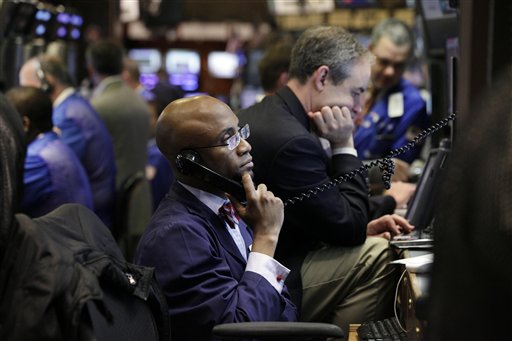By CHRISTINA REXRODE
AP Business Writer
NEW YORK
As U.S. stocks struggled for direction, world finance leaders struggled for a way out of Europe’s mounting debt crisis.
Major market indexes ricocheted between small gains and losses in morning trading and were little changed by early afternoon. European markets were mixed and the euro edged lower against the dollar.
Finance ministers and central bank presidents from the world’s seven wealthiest nations held an emergency conference call to discuss how Europe can heal its weakest countries without alienating the stronger ones that have to foot the bill. Leaders are worried that Spain and Cyprus, which are scrambling for money to prop up their troubled banks, will soon need to be bailed out by their stronger counterparts.
Spain isn’t part of the Group of Seven, the countries that held the conference call, but the U.S. and Germany are. As the G-7 leaders met, Spain’s prime minister issued a plea for Europe “to support those that are in difficulty.” Just beforehand, Spain’s finance minister said the country was in danger of not being able to borrow money on the open market.
The yield on Spain’s 10-year bonds crept down to 6.31 percent. The rate is still dangerously high. Other countries including Greece and Portugal were been forced to seek bailouts once their borrowing costs hit 7 percent.
In the U.S., indexes briefly popped higher in midmorning trading after the Institute for Supply Management reported that U.S. service companies grew at a slightly faster pace in May.
Otherwise, indexes were moving in narrow ranges. The Dow Jones industrial average fell as much as 29 points and rose as much as 35. It was a tiny range given last Friday’s 275-point plunge, and it re-enforced the idea that traders aren’t sure what to do.
The Dow was up 10 shortly before 1 p.m., at 12,113. The Standard & Poor’s 500 index was up four to 1,282, and the Nasdaq composite index was up six to 2,766.
It’s been a scorching few weeks for the market, which powered higher in the first three months of the year, held onto its gains in April, and then seemed to self-destruct in May as concerns about Europe came to a head. The market racked up a catalogue of unwelcome milestones: The Dow had its worst month in two years in May, and Friday was its worst single-day loss in 2012. The Nasdaq dipped more than 10 percent from its peak this spring, meaning it is in what market watchers call a correction.
June doesn’t promise to be much quieter, as Greece holds elections June 17 that will largely determine whether it keeps using the euro or breaks away from the 16 other countries that do.
A central problem in Europe is whether the best solution means spending less money or more. Stronger countries like Germany are unhappy about having to bail out the weaker ones. The German finance minister said again Tuesday he would oppose watering down budget cuts that stronger countries like his own want to impose on weaker countries like Greece.
Any solution is sure to irritate at least some countries.
Some leaders have pushed for a central body that would have more authority over banks in all 17 countries that use the euro. A deposit-insurance program, like the one run by the Federal Deposit Insurance Corp. in the U.S., could keep fearful customers in Spain and Greece from yanking their money out of banks there.
Spain on Tuesday pushed for a European “banking union” that could give bailouts to European banks directly, possibly bypassing national governments and the strings they want to attach to any rescue loans.
European markets were mixed. Greece’s main stock index plunged 5 percent, but Germany’s benchmark index was flat. Stocks mostly rose in France and Spain.
In the United States, home builders Lennar and PulteGroup rose more than 4 percent after getting hammered in the last two days.
Starbucks fell 3 percent a day after announcing ambitious plans to buy a small California bakery chain and remake its food offerings. Starbucks is facing stiff competition from fast-food chains that do their own specialty coffees.
Dollar General fell 3 percent after announcing late Monday that top executives would sell some of their stock.
US Airways rose 4 percent after announcing that per-seat passenger revenue rose 6 percent in May compared to a year ago.

COMMENTS
Please let us know if you're having issues with commenting.